英语三大从句精编版
(word完整版)英语三大从句知识,文档
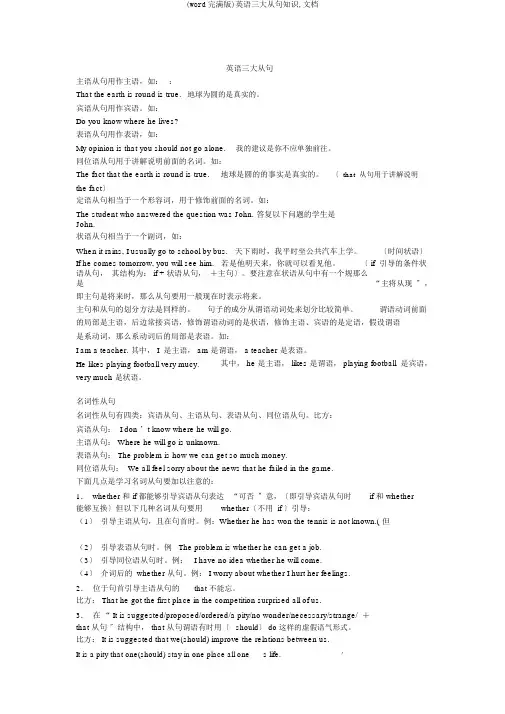
英语三大从句主语从句用作主语,如::That the earth is round is true.地球为圆的是真实的。
宾语从句用作宾语。
如:Do you know where he lives?表语从句用作表语,如:My opinion is that you should not go alone.我的建议是你不应单独前往。
同位语从句用于讲解说明前面的名词。
如:The fact that the earth is round is true.地球是圆的的事实是真实的。
〔that从句用于讲解说明the fact〕定语从句相当于一个形容词,用于修饰前面的名词。
如:The student who answered the question was John. 答复以下问题的学生是John.状语从句相当于一个副词,如:When it rains, I usually go to school by bus. 天下雨时,我平时坐公共汽车上学。
〔时间状语〕If he comes tomorrow, you will see him. 若是他明天来,你就可以看见他。
〔 if 引导的条件状语从句,其结构为: if + 状语从句,+主句〕。
要注意在状语从句中有一个规那么是“主将从现〞,即主句是将来时,那么从句要用一般现在时表示将来。
主句和从句的划分方法是同样的。
句子的成分从谓语动词处来划分比较简单。
谓语动词前面的局部是主语,后边常接宾语,修饰谓语动词的是状语,修饰主语、宾语的是定语,假设谓语是系动词,那么系动词后的局部是表语。
如:I am a teacher. 其中, I 是主语, am 是谓语, a teacher 是表语。
He likes playing football very mucy.其中, he 是主语, likes 是谓语, playing football 是宾语,very much 是状语。
高中英语三大从句精编版
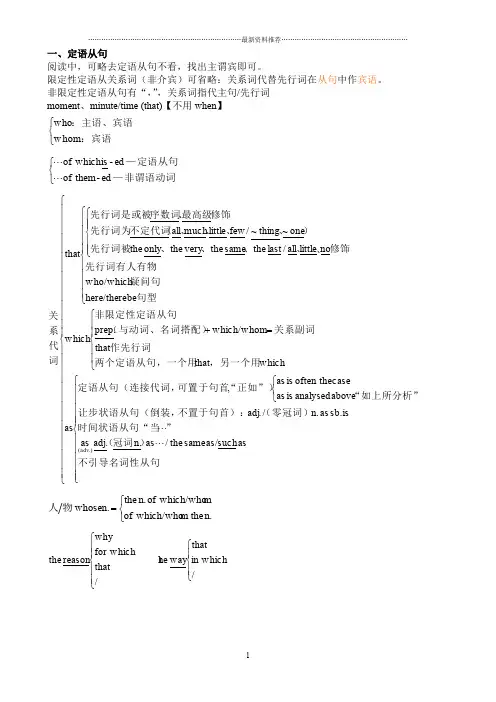
一、定语从句阅读中,可略去定语从句不看,找出主谓宾即可。
限定性定语从关系词(非介宾)可省略:关系词代替先行词在从句中作宾语。
非限定性定语从句有“,”,关系词指代主句/先行词moment 、minute/time (that)【不用when 】⎩⎨⎧:宾语:主语、宾语hom w who ⎩⎨⎧ ed - them of ed -is which of 非谓语动词—定语从句— ⎪⎪⎪⎪⎪⎪⎪⎪⎪⎪⎪⎪⎪⎪⎩⎪⎪⎪⎪⎪⎪⎪⎪⎪⎪⎪⎪⎪⎪⎨⎧⎪⎪⎪⎪⎪⎩⎪⎪⎪⎪⎪⎨⎧⎩⎨⎧⎪⎪⎩⎪⎪⎨⎧=+⎪⎪⎪⎪⎩⎪⎪⎪⎪⎨⎧⎪⎪⎩⎪⎪⎨⎧不引导名词性从句)冠词(”时间状语从句“当(零冠词)不置于句首):让步状语从句(倒装,“如上所分析”“正如”)可置于句首定语从句(连接代词,,另一个用两个定语从句,一个用作先行词关系副词(与动词、名词搭配)非限定性定语从句句型疑问句先行词有人有物修饰、、、、先行词被)、、、、(不定代词先行词为修饰最高级、序数词先行词是或被词代系关as such as/ same the /as n. adj. as is sb. as .n /.adj aboveanalysed is as case often the is as ,as which that that which/whom prep.which be here/there who/which no 、little all /last the same the very the only the one ~thing ~/few little much all that (adv.) ⎩⎨⎧=n. the m which/who of m which/who of n. the n. whose 物人 ⎪⎩⎪⎨⎧⎪⎪⎩⎪⎪⎨⎧/in which that way he t /that for which why reason theas as such so same the ⎪⎪⎭⎪⎪⎬⎫ where stage case point position situation when ages times occasion childhood ⎪⎪⎪⎭⎪⎪⎪⎬⎫⎪⎪⎭⎪⎪⎬⎫(阶段)病例)(情况、事例、案件、(地点))位置()情况((时代)、场合)时刻( ⎩⎨⎧→→n.the this is that n. the is this n. this is t (that)/wha one the is n. this ⎩⎨⎧(复数)(单数)v.of one the v.of one only the 二、状语从句⎪⎪⎪⎪⎪⎪⎪⎪⎪⎪⎪⎪⎩⎪⎪⎪⎪⎪⎪⎪⎪⎪⎪⎪⎪⎨⎧⎩⎨⎧⎩⎨⎧++++⎩⎨⎧++⋯⋯⎭⎬⎫⎩⎨⎧⎩⎨⎧省略主语主从句主语一致,从句,就一时间段时间段非延续性延续性条件时间将从现时间、条件、让步:主);而虽然(尽管:(考虑到)既然:句从语状be B)when A(,rcely hardly/sca )B than (,A sooner no )B (A sincebeen has /is It before be will /was It until not till /until &once when ,doing be do to about be by going with time bygoes time as while when did done had 三、名词性从句(主语、宾语、表语、同位语;陈述语序).☆引导一个从句,只用一个引导词⎩⎨⎧ wrong s what'matter the s what')固定语序(作陈述语序 what 可指代“某…” eg :“不再是以前的样子”whatwhich 表示从给定范围中选择其一who 在主、从中用作主语、宾语;whom 在主、从中用作宾语常用表语从句:It seems/…… as if/though …….常用主语从句(it 作形式主语):①It ’s no wonder (难怪) that ……. ②It’s a pity (遗憾) that …….连接副词:how 短语(how …)等⎩⎨⎧that it do that P.adj./n./P. be it it 形式宾语:形式主语:⎩⎨⎧ ever - matter no ”)从句(“无论让步状语从句;名词性让步状语从句 ()()⎪⎪⎩⎪⎪⎨⎧do to ~not or ~whether ,if if/though as that ;是否”);:各种名词性从句(““如果”;条件状语从句“是否”非句首主语从句极少用于:动宾从句,:表“好像”省实义;动宾后第一个可:主从常用于句首;无(不作成分)连词 ⎪⎩⎪⎨⎧ that is sb.) (to known is What that sb.) (to known s It'sb.), (to known is As 众所周知⎪⎪⎩⎪⎪⎨⎧⋯⋯+that because s 'It why is That that is Why that is reason why The 结果)( ⎩⎨⎧+时态前移said/asked if/whether ask say 宾从否定前移:think/believe/imagine/suppose sth. be/do not →don ’t ~ sth. be/do同位语从句解释其内容:fact/news/idea/hope/thought/order/fear/doubt/word (口信)/ proof (证据)/belief/story。
初中英语必会三大从句讲解
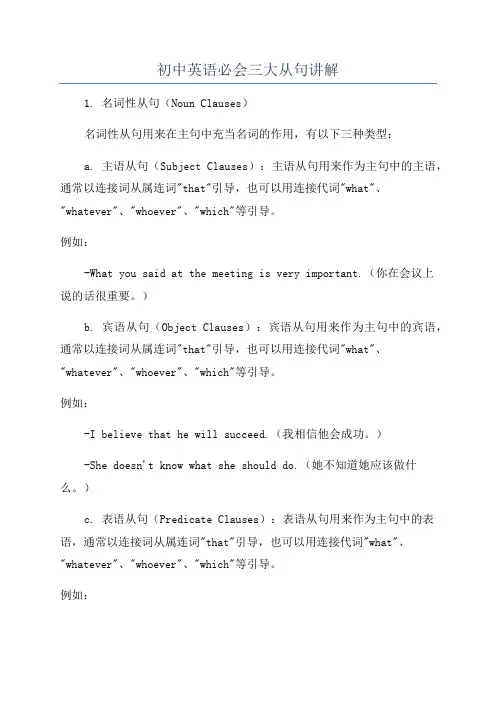
初中英语必会三大从句讲解1. 名词性从句(Noun Clauses)名词性从句用来在主句中充当名词的作用,有以下三种类型:a. 主语从句(Subject Clauses):主语从句用来作为主句中的主语,通常以连接词从属连词"that"引导,也可以用连接代词"what"、"whatever"、"whoever"、"which"等引导。
例如:-What you said at the meeting is very important.(你在会议上说的话很重要。
)b. 宾语从句(Object Clauses):宾语从句用来作为主句中的宾语,通常以连接词从属连词"that"引导,也可以用连接代词"what"、"whatever"、"whoever"、"which"等引导。
例如:-I believe that he will succeed.(我相信他会成功。
)-She doesn't know what she should do.(她不知道她应该做什么。
)c. 表语从句(Predicate Clauses):表语从句用来作为主句中的表语,通常以连接词从属连词"that"引导,也可以用连接代词"what"、"whatever"、"whoever"、"which"等引导。
例如:-Her dream is that she can travel around the world.(她的梦想是能够周游世界。
)2. 定语从句(Adjective Clauses)定语从句用来修饰或限制名词或代词,通常以关系代词"who"、"whom"、"which"、"whose"、"that"等引导。
英语中的三大从句汇总
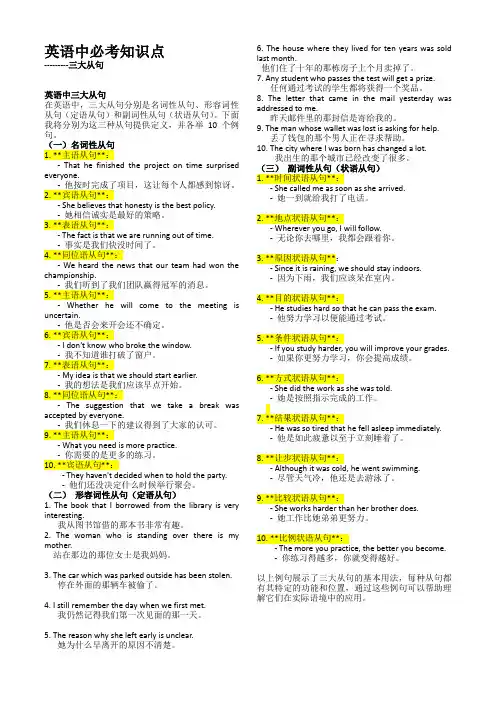
英语中必考知识点---------三大从句英语中三大从句在英语中,三大从句分别是名词性从句、形容词性从句(定语从句)和副词性从句(状语从句)。
下面我将分别为这三种从句提供定义,并各举10个例句。
(一)名词性从句1. **主语从句**:- That he finished the project on time surprised everyone.- 他按时完成了项目,这让每个人都感到惊讶。
2. **宾语从句**:- She believes that honesty is the best policy.- 她相信诚实是最好的策略。
3. **表语从句**:- The fact is that we are running out of time.- 事实是我们快没时间了。
4. **同位语从句**:- We heard the news that our team had won the championship.- 我们听到了我们团队赢得冠军的消息。
5. **主语从句**:- Whether he will come to the meeting is uncertain.- 他是否会来开会还不确定。
6. **宾语从句**:- I don't know who broke the window.- 我不知道谁打破了窗户。
7. **表语从句**:- My idea is that we should start earlier.- 我的想法是我们应该早点开始。
8. **同位语从句**:- The suggestion that we take a break was accepted by everyone.- 我们休息一下的建议得到了大家的认可。
9. **主语从句**:- What you need is more practice.- 你需要的是更多的练习。
10. **宾语从句**:- They haven't decided when to hold the party.- 他们还没决定什么时候举行聚会。
高考英语三大从句复习(可编辑修改word版)
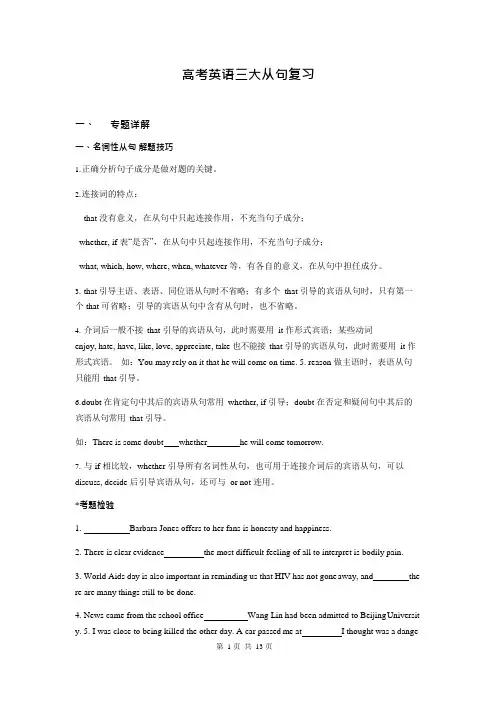
高考英语三大从句复习一、专题详解一、名词性从句解题技巧1.正确分析句子成分是做对题的关键。
2.连接词的特点:that 没有意义,在从句中只起连接作用,不充当句子成分;whether, if 表“是否”,在从句中只起连接作用,不充当句子成分;what, which, how, where, when, whatever 等,有各自的意义,在从句中担任成分。
3.that 引导主语、表语、同位语从句时不省略;有多个that 引导的宾语从句时,只有第一个that 可省略;引导的宾语从句中含有从句时,也不省略。
4.介词后一般不接that 引导的宾语从句,此时需要用it 作形式宾语;某些动词enjoy, hate, have, like, love, appreciate, take 也不能接that 引导的宾语从句,此时需要用it 作形式宾语。
如:You may rely on it that he will come on time. 5. reason 做主语时,表语从句只能用that 引导。
6.d oubt 在肯定句中其后的宾语从句常用whether, if 引导;doubt 在否定和疑问句中其后的宾语从句常用that 引导。
如:There is some doubt whether he will come tomorrow.7.与if 相比较,whether 引导所有名词性从句,也可用于连接介词后的宾语从句,可以discuss, decide 后引导宾语从句,还可与or not 连用。
*考题检验1.Barbara Jones offers to her fans is honesty and happiness.2.There is clear evidence the most difficult feeling of all to interpret is bodily pain.3.World Aids day is also important in reminding us that HIV has not gone away, and the re are many things still to be done.4.News came from the school office Wang Lin had been admitted to Beijing Universit y.5. I was close to being killed the other day. A car passed me at I thought was a dangerous speed.6.There is no doubt John will support you.7.Could I speak to is in charge of International Sales please?8.We have offered her the job, but I don’t know she will accept it.9.Twenty students want to attend the class that aims to teach to read fast.10.I am afraid he’s more of a talker than a doer, which is he never finish anything.答案:1,what 2. that 3. that 4. that 5. what 6.that 7. whoever 8. whether/if 9. how 10. why二、定语从句解题技巧1.正确分析句子成分是做对题的关键。
英语 三大从句
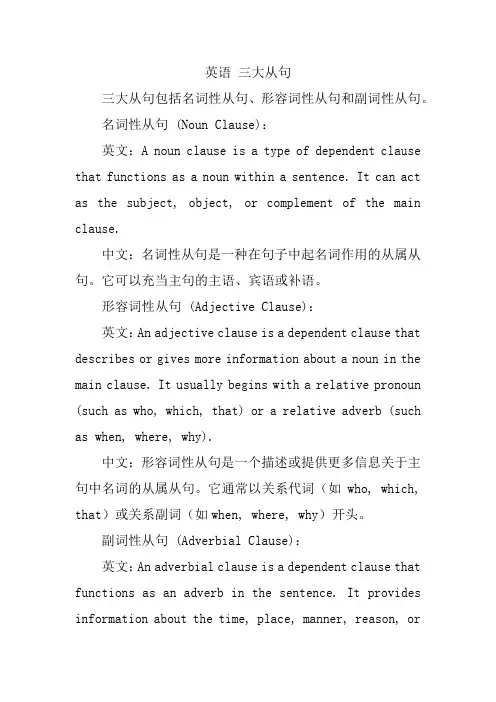
英语三大从句三大从句包括名词性从句、形容词性从句和副词性从句。
名词性从句 (Noun Clause):英文:A noun clause is a type of dependent clause that functions as a noun within a sentence. It can act as the subject, object, or complement of the main clause.中文:名词性从句是一种在句子中起名词作用的从属从句。
它可以充当主句的主语、宾语或补语。
形容词性从句 (Adjective Clause):英文:An adjective clause is a dependent clause that describes or gives more information about a noun in the main clause. It usually begins with a relative pronoun (such as who, which, that) or a relative adverb (such as when, where, why).中文:形容词性从句是一个描述或提供更多信息关于主句中名词的从属从句。
它通常以关系代词(如who, which, that)或关系副词(如when, where, why)开头。
副词性从句 (Adverbial Clause):英文:An adverbial clause is a dependent clause that functions as an adverb in the sentence. It provides information about the time, place, manner, reason, orcondition of the action in the main clause.中文:副词性从句是一个在句子中起副词作用的从属从句。
初中英语三大从句精讲
初中英语三大从句精讲Errors corrected:XXX.XXX at the end of sentences.XXX.XXX direct speech.XXX.XXX.XXX.Revised:Middle School English: Mastering XXX ClausesObject Clausesn: A clause that ns as the object of a sentence is called an object clause.Connecting Words:That": I think that you can pass the exam.XXX": I don't know what the word means.Wh-": I don't know what the word means。
Wh-" for ns: I don't know where he found the book.Use "whether" alone in the following ns:With "or not": I don't know whether it's raining or not.With infinitives: XXX't know whether to accept the XXX.XXX: It depends on whether he is coming.XXX:If the main clause is in the simple present tense。
the tense of the object clause depends on the n (all tenses are possible)。
For example: She wants to know what he has done for the exam.If the main clause is in the simple past tense。
中考英语三大从句知识点总结.doc
中考英语三大从句知识点总结精品|初中三大从句总结:定语从句精讲,必须收藏!定义在主句中做宾语的从句叫做宾语从句。
(简单来讲,就是用一个句子充当了另一个句子的宾语)如:She knew that the teacher had seen the film.“that the teacher had seen the film”做knew 的宾语,同时又是由连接词that 引导的从句,所以它叫做宾语从句。
分类1.动词宾语从句:顾名思义,它是位于动词后面的宾语从句。
He asked whose handwriting was the best in our class.他问我们班上谁的书法。
2.介词宾语从句:顾名思义,它是位于介词后面的宾语从句。
I agree with what you said just now.我同意你刚才说的话。
3.形容词宾语从句:顾名思义,它是位于形容词后面的宾语从句。
I am afraid that I will be late.恐怕我要迟到了。
语序无论主句是陈述句还是疑问句,宾语从句都必须使用陈述语序,即“主句+连词+宾语从句(主语+谓语+……)”句式。
根据连接词在从句中所担任的不同成分,可分为以下四种:1)连接词+谓语。
连接词在从句中作主语。
常见的连接词有:who,what,which等。
Could you tell me who knows the answer,please?你能告诉我谁知道答案吗?The small children don't know what is in their stockings.这些小孩子不知道袜子里有什么东西?2)连接词+名词+谓语。
连接词在从句中作主语的定语。
常见的连接词有:whose,what,which,how many,how much等。
He asked whose handwriting was the best in our class.他问我们班上谁的书法。
(完整版)小学三大从句讲解
三大从句讲解一、宾语从句——完满句子做宾语You told me where you live.二、定语从句——完满句子做定语,修饰前面的名词I know the lady who is in pink.She gave me the book which is in English.三、状语从句——完满句子做状语,修饰动词或一整个句子I want be a doctor when I grow up.练习 1——判断以下从句种类1.You know how I feel.2.Can you tell me where my uncle is?3.I don’tknow the place you asked me.4.If you go abroad, I will go with you.5.I went to the restaurant where you asked me to.6.She is the lady who you are looking for.练习 2——请找出从句中含有的疑问词1.Sally told me where she would go.2.Do you know when she will be back?3.She is the person who(that) helped me a lot.4.This is the bike which(that) I bought last week.5.When he was a child, his parents went to America.6.Can she understand how we can pass the exam?练习 3——请依照上面的规律,填空。
1.Miss White is a teacher teaches us English.2.Tom gave me a present was a toy car.3.Can you tell my she lives?4.This is the book I lent you last week.5.My mother introduces a girl is in the same school to me.。
中考英语必考的3大从句精选全文完整版
可编辑修改精选全文完整版中考英语必考的3大从句中考英语必考的3大从句导语:宾语从句、状语从句和定语从句是初中阶段必须会学到的内容,从句对于同学们来说有一些难度,因为之前没有接触过这个名词。
下面是yuwenmi小编为大家整理的优秀英语作文,欢迎阅读与借鉴,谢谢!中考英语必考的3大从句宾语从句是指在一个句子中充当宾语的句子。
例如:He said that he wanted to be a teacher when he grew up.他说长大后想当一名老师。
①宾语从句的连接词:宾语从句的连接词包括that、if/whether(是否)、特殊疑问词。
②宾语从句的语序:A. 宾语从句的连接词后加陈述语序(主语在前,谓语在后)。
例如:I want to know if he can come tomorrow.我想知道他明天是否能来。
B. 当连接词本身又是宾语从句的主语时,后面直接加谓语动词。
例如:She asked me who had helped him.她问我谁帮助了他。
③宾语从句的时态,只要记住以下口诀就可以了。
“主现则从任,主过则从过,客观真理一般现”A. 主现则从任:主句如果是一般现在时,则从句根据时间状语需要从八种时态中任选一种。
例如:He tells me he studied English in England last year.他告诉我他去年在英国学习英语。
B. 主过则从过:主句如果是一般过去时,则从句根据时间状语需要从四种带“过”字的时态中任选一种,带“过”字的时态分别是如:一般过去时,过去进行时,过去将来时,过去完成时。
例如:He told me that he liked playing football.他告诉我他喜欢踢足球。
C. 客观真理一般现:客观真理永远用一般现在时。
例如:He said the moon goes around the earth.他说月亮绕着地球转。
- 1、下载文档前请自行甄别文档内容的完整性,平台不提供额外的编辑、内容补充、找答案等附加服务。
- 2、"仅部分预览"的文档,不可在线预览部分如存在完整性等问题,可反馈申请退款(可完整预览的文档不适用该条件!)。
- 3、如文档侵犯您的权益,请联系客服反馈,我们会尽快为您处理(人工客服工作时间:9:00-18:30)。
复合句【语法要点】复合句是由一个主句加一个或几个从句所构成的句子。
从句只用作句子的一个成分,不能独立。
根据从句在句子中的作用,可分为名词性从句、定语从句和状语从句三类。
(一)名词性从句名词性从句包括主语从句、表语从句、宾语从句、同位语从句。
其关联词有连接词that、if、whether;疑问代词who、what、which和疑问副词when、where、how、why等。
1.名词性从句句法结构:从属连词that whether 主语从句That he will come is certain.(that不可省)Whether she is coming or not doesn’t matter too much.(不能用if)宾语从句I think(that)he will be all right in a few days.I went in and asked if(=whether)they had a cheap suit.I wonder whether(不能用if)it is true or not.表语从句The fact is(that)I have never been there.The question is whether(不能用if)it is worth doing.同位语从句The fact that she had not said anything surprised all of us.They asked me the question whether the work was worth doing.连接代词that who whom whose which 主语从句Who will help him is not known.What he said is very important.Which side will win is not clear.宾语从句(1)作及物动词的宾语。
例如:I really don’t know what he is doing.Do you know who/whom they are waiting for?He asked whose dictionary it was.He can’t tell which method they will use for the experiment.(2)作介词的宾语。
例如:Pay attention to what the teacher said.I wondered to whom he had given the letter.表语从句That is what he is worried about.The question is who will come here.The question is which team will win the match.连接副词where when why how 主语从句Where she has gone is not known yet.When they will start is not known yet.Why he did it wasn’t quite clear.How he became a great scientist is known to us all.宾语从句I don’t know where we are going to have the meeting.Please tell me when we shall discuss our work plan.Do you know why he said that?Will you tell me how I can get to the railway station? 表语从句That is where he was born.This is why he is late.This is how he did it.The question is when he will be back.同位语从句I have no idea when he will come back.You have no idea how worried I was.The problem is where we can get so much money.2.名词性从句的其它用法:1)if不能引导表语从句。
连接代词who、what、whose、which不能引导同位语从句。
2)有时as、as if/though、because也可以引导表语从句,能跟表语从句的谓语动词一般为系动词be、seem、look等。
例如:Things are not always as they seem to be.事情并不总是像表面上看来的那样。
It looks as if it were going to rain. It is because you eat too much.3)介词宾语不可以用which来引导,而要用what来引导。
例如:We can learn what we did not know. He will talk to us about what he saw in the U.S.4)连词that引导的名词性从句除能用在except、but、in后之外很少作介词的宾语,。
其它一些介词的宾语从句如果由连词that引导,则需用it先行一步作形式宾语。
例如:He is a good student except that he is careless.You may depend on it that they will support you.5)若主句谓语动词是及物动词make、find、think、see、hear等,则把宾语从句置于宾语补足语之后,用it作形式宾语。
例如:We find it necessary that we practise spoken-English every day.6)某些作表语的形容词或过去分词后常接宾语从句,如sure、happy、glad、certain、pleased、afraid、surprised、satisfied等,连词that可省略,有的语法书称之为状语从句。
例如:I am sure that he will succeed.I am afraid you don’t understand what I said.Mother was very pleased her daughter had passed the exams.7)连接代词whoever、whatever、whichever也可引导宾语从句。
例如:I will show you whatever you want to see.You may choose whoever you like. I will take whichever fits the sockets.(插座)8)同位语从句一般跟在某些表示抽象概念的名词后面,用以说明名词所表示的具体内容。
常跟同位语从句的名词主要有:idea、news、fact、promise、answer、belief、condition、doubt、fear、hope、order、problem、proof、question、reply、report、suggestion、thought、truth等。
由连词that引导同位语从句既无语法功能,也无词汇意义,只是引导词;由连词whether引导同位语从句无语法功能,但有词汇意义“是否”;由连词when、where、how引导同位语从句在句中分别作作时间、地点和方式状语。
注意→①关联词只能用whether不能用if表示“是否”的情况如下:A)在表语从句和同位语从句中。
例如:The question is whether the film is worth seeing.The news whether our team has won the match is unknown.B)在主语从句中,只有it作形式主语时whether和if均可。
否则,也只能用whether。
例如:Whether we shall attend the meeting hasn’t been decided yet.It hasn’t been decided whether/if we shall attend the meeting.C)在介词之后(介词往往可以省略)。
例如:It all depends (on) whether they will support us.D)后面直接跟动词不定式时。
例如:He doesn’t know whether to stay or not.E)与or not连用时。
例如:We didn’t know whether or not she was ready.②关联词if、whether均可使用的情况如下:A)引导宾语从句,但当宾语从句是否定句时,一般用if引导。
例如:I wonder if/whether the news is true or not. I don’t care if it doesn’t rain.B)在“be+形容词”之后。
例如:He was not sure whether/if it is right or wrong.③用if引导宾语从句如果会引起歧义,应避免使用if而用whether。
试比较:Please let me know if you want to go. Please let me know whether you want to go.(if从句既可理解为宾语从句,也可理解为条件状语从句)doubt作“怀疑”解接宾语从句时,主句为肯定句用whether或if,主句为否定句或疑问句用that。
10)it作形式主语①that所引导的主语从句常由代词it作形式主语。
且wh-系列引导词引导的从句均可。
例如:It makes everyone happy that the girl is still alive.It doesn’t matter too much whether he’s coming or not.It is still open to question who is to head the group. 谁领导这个小组还没定下来。
②常以it作形式主语的句型有:—It +be+形容词(obvious、true、natural、surprising、good、wonderful、funny、possible、likely、certain、probable)+that从句—It +be+名词词组(no wonder、an honour、a good thing、a pity、no surprise)+that从句—It +be+过去分词(said、reported、thought、expected、decided、announced、arranged)+that从句—It +seem、happen等不及物动词及短语+that从句—It +doesn’t matter(makes no difference, etc)+连接代词或连接副词引导的主语从句—当that引导的主语从句出现在疑问句中时,也要以it作形式主语,而把主语从句后置。
